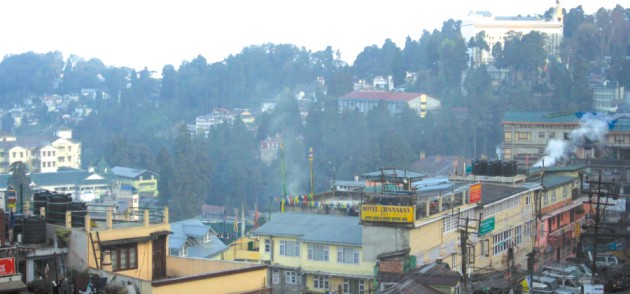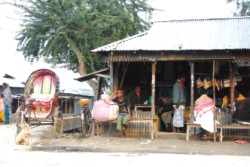Perceptions
A MOUNTAIN IN NEED
Andrew Eagle

View towards Kanchenjunga from Darjeeling Town. Photo: Andrew Eagle
Hatiya is beautiful. The morning belongs to kingfishers in brilliant blue swooping to catch fish from canals; the day is for large monitor lizards rustling in the bushes and a mongoose darting with urgency across a rural laneway. The afternoon is for the buffalo lazing semi-submerged in a pond, off-duty from the plough; and the night is the domain of jinns, bhoots and their company, the howl of foxes and pained cry of wild cats.
It is in the long evenings which were not so long ago lit by kerosene lamp, in the tea shops, amongst the village men socialising, where even far-fetched plans sound grave. Situ is to blame for my gramer bari or village house affliction, for not only did he donate his family, his neighbourhood to furnish my life with hospitality as plentiful as the monsoon rains, but because he too has a traveller's soul.
In the evenings, between the chatter over the price of vegetables, news of an impending marriage or a recent death, we'd make travel plans for entertainment, translated to include the other villagers. Mostly they were over-the-top, the temples of Thailand, the north of Norway to see the midnight sun of the Arctic summer, or the Australian outback with its endless miles of sky. Once he listed a budget for a trip to Ukraine via Moscow. I still laugh about the figures: $7.97 for a train ticket to travel thirteen or something hours, $5.61 for a hotel room… okay that's exaggerated, I don't remember exactly, but they were a little on the low side.
You can always tell a traveller. It's not by the number of stamps in their passport, but in their eyes. Just talk of journey and a traveller's eyes will get up in anticipation of immediate departure. My eyes have always betrayed me that way and so did his. It was only through the accident of our different birthplaces that I'd been granted the luxury of visiting many countries while Situ had not explored beyond Bangladesh.
 |
| Tea shop in Aziza Market, Hatiya. Photo: Andrew Eagle |
I used to bring when I could, travel books listing all the world's countries, the basic facts and a few pictures. He used to call me in Sydney and say, 'I've just been reading about Malawi.' His wife used to complain that he wouldn't turn the hurricane lamp down until very late from dreaming his way around the world through the books; and within a year, cover to cover they'd be worn from having been read so thoroughly. It's all behaviour to be expected from a traveller.
As it is between friends, mocking is expected behaviour between us. I used to list the countries I'd seen, counting the Sub-continental way using the creases in the fingers; then start to list the villages around about which was Situ's travel list. And I used to say, 'you need to see a mountain. You can't have a successful life without at least one mountain in it.' 'I've been to Bandarban,' he'd reply. 'If they're mountains, then why is it called the Hill Tracts? No, you need a big mountain, with cliffs and snow.'
With the joking I grew to know that I would take him somewhere; that I should find him a mountain. Such things are important.
Of course I would benefit too, since one's first trip to somewhere foreign is an incredible experience that can never be repeated; the next best thing would be to witness a fellow traveller's first trip abroad.
It happened in 2004. There was no international phone line to Hatiya in those days, so Situ used to make the somewhat arduous trip across the river, three hours, where he'd have to stay the night, just for a few minutes on the phone to Sydney. I was planning the usual visit to Hatiya; it happened nearly every year. This time I said, 'we're meeting in Kolkata.' One can't see through phone lines but I knew what his eyes looked like when he heard it.
Funnily enough Situ had always said he didn't wish for India because 'it's the same as Bangladesh.' Of course there are no two countries the same, as much as they might be branches of the same tree. India was easily affordable on a Sydney salary and for him the visa wouldn't be much fuss. I knew he'd enjoy it. I always had.
Somehow he organised the passport and visa; there's a few stories in that but best that he should tell it. Somehow he took himself to Benapole, nearly catching pneumonia on his first air-conditioned bus ride, and crossed the border alone.
Meanwhile I rang Kolkata, as fortunately I have a friend there too, Jayanta. He has a distinguished, really dry sense of humour, and he'd just gotten married. I was yet to meet his wife. 'So your wife,' I asked, 'is she nice?' 'When you come to Kolkata,' he said, 'you can make your own determination.'
I asked if there would be any problem if I brought a friend this time, from Bangladesh. 'Hindu or Muslim,' he asked. 'Muslim.' 'Is he a good person?' I said he was and Jayanta agreed to trust my determination on that count.
Such was the excitement that my stomach didn't descend to land at Dum Dum along with the plane: Situ should be there with any luck. Jayanta should be there with any luck. I met Situ first. He'd been waiting all day, sneezing from the bus ride, buying the consecutive three-hour tickets needed to wait inside the terminal building. But he was waiting and sneezing in India! Jayanta had brought a friend with an extra motorbike, so it was no trouble to power off to his place where we stayed a couple of days, during which they got to know each other. Jayanta's wife was lovely, I determined.
There were many firsts for Situ on his trip: first masala dosa, first iced tea and iced coffee, now all readily available in Dhaka. He'd seen with dismay the historical mosque near Pandua, West Bengal. It was partly built from destroyed Hindu temples and you can see the faces of Hindu deities in parts of the brickwork. More inspiring was the coexistence of Hindu swastikas decorating the mehrab, the focal point of the mosque. Situ said in Bangladesh he'd been taught the arrival of Islam in the Sub-continent had been peaceful. Pandua says it wasn't absolutely so.
It was hot, the day we went to find his mountain, it was roasting. With sweat pouring down our faces like a minor waterfall, at the Siliguri jeep stand and headed for Darjeeling, I suggested we needed to take the jumpers out of my bag: I'd brought two since Bangladeshi winters are not quite as cold as in Sydney and Situ would need Sydney-strength apparel for what would be undoubtedly the coldest day of his life. He thought I was mad, in the heat. It was well over thirty degrees and I wanted a jumper!
I make little jokes about the jeep ride: Situ was so scared, as we rounded some of those vertical precipes along the roadway, he held onto the side of the jeep so intensely that layers of the skin on his hands came off. Truth was even on my second time there I was slightly nervous too.
In Darjeeling, Situ burnt himself while taking his first hot shower. It's logical really, what he thought, that the hot water tap would come out at a set, comfortable temperature, rather than needing to regulate it with the cold tap. It could be like that. In Darjeeling we watched in awe as the clouds below us lifted over the course of the morning and continued above as we ate breakfast; and in Darjeeling we saw the white horizon hairstyle of Kanchenjunga, a name Situ would soon be using to criticise my Sydney-sized belly.
The Himalayas are where Hatiya comes from, by the Ganges, by the Brahmaputra. The Himalayas are Hatiya's mother.
Back in the tea shops some weeks later, folk listened in wonderment as Situ described to them about 'the town above the clouds.' So he got his mountain in the end.
Copyright
(R) thedailystar.net 2010 |
